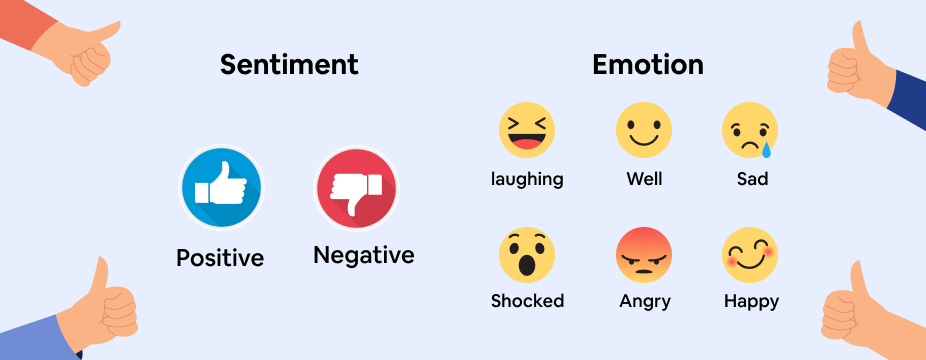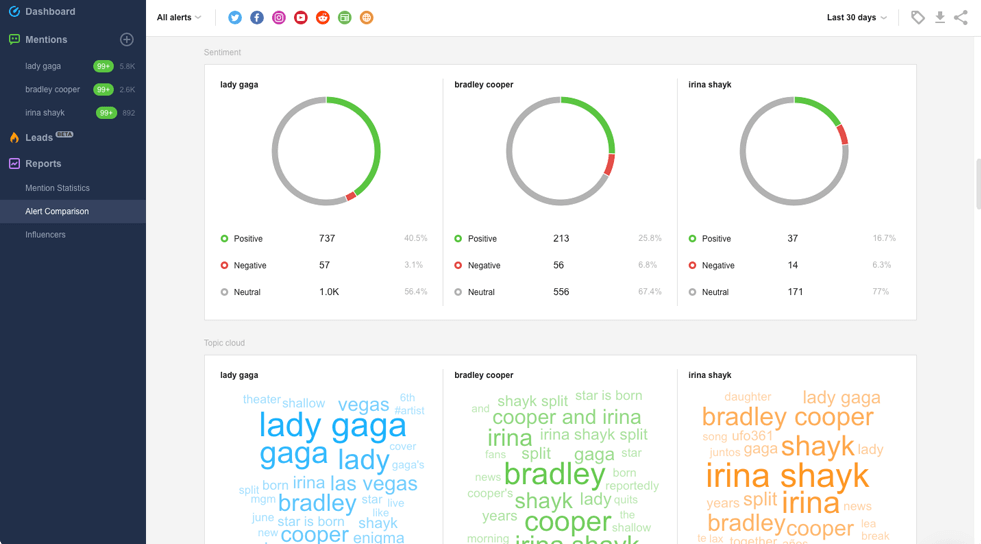In today’s digital landscape, social media has become a powerful platform for businesses to connect with their customers and understand their opinions and preferences. However, sifting through the vast amount of social media data manually is an overwhelming task. This is where social media sentiment tools come into play. In this article, we will explore the concept of social media sentiment analysis and delve into the best social media sentiment tools available in the market to help businesses make data-driven decisions and improve their online presence.
What are Social Media Sentiment Tools?

Definition and Purpose
Social media sentiment tools are software applications that use natural language processing (NLP) and machine learning algorithms to analyze the sentiment expressed in social media posts. These tools aim to categorize social media content as positive, negative, or neutral, providing businesses with valuable insights into public opinion.
Importance of Social Media Sentiment Analysis
Social media sentiment analysis is crucial for businesses as it helps them gauge customer sentiment, improve brand reputation, and identify market trends. By understanding how customers perceive their products or services, businesses can make informed decisions to enhance customer satisfaction and drive growth.
Benefits of Using Social Media Sentiment Analysis Tools
Understanding Customer Sentiment
Social media sentiment tools allow businesses to gain deep insights into customer sentiment toward their brand. By analyzing the sentiment behind customer posts and comments, businesses can identify areas of improvement, address customer concerns, and tailor their strategies to meet customer expectations.
Improving Brand Reputation
A positive brand reputation is vital for business success. Social media sentiment tools enable businesses to monitor online conversations and promptly address any negative sentiment or issues raised by customers. By actively engaging with customers and resolving their problems, businesses can maintain a positive brand image and build long-lasting customer relationships.
Identifying Market Trends
Social media sentiment tools provide businesses with real-time data on market trends and consumer preferences. By analyzing social media conversations, businesses can identify emerging trends, understand customer needs, and adapt their marketing strategies accordingly. This proactive approach helps businesses stay ahead of the competition and seize new opportunities.
Best Social Media Sentiment Tools

There are several excellent social media sentiment tools available today, each offering unique features and benefits. Here are three top tools worth considering:
Aim Insights
AIM Insights is a comprehensive social media sentiment analysis tool that offers real-time monitoring of social media platforms, sentiment categorization, and detailed analytics. Its intuitive dashboard provides businesses with actionable insights to improve customer satisfaction and brand perception.
Brandwatch
Brandwatch is a user-friendly sentiment analysis tool that specializes in sentiment tracking across various social media channels. With its sentiment heatmaps and sentiment trend analysis, businesses can visualize sentiment patterns and make data-driven decisions to enhance their social media strategy.
Brand24
Brand24 is an advanced sentiment analysis tool with robust AI capabilities. It not only analyzes sentiment but also provides sentiment intensity scoring and topic extraction. Businesses can leverage these insights to uncover nuanced customer opinions and gain a deeper understanding of their target audience.
How to Choose the Right Social Media Sentiment Tool
Choosing the right social media sentiment tool for your business is essential for effective sentiment analysis. Consider the following factors when selecting a tool:
Consider Your Business Needs
Identify your specific requirements and objectives before choosing a tool. Determine whether you need real-time monitoring, sentiment analysis for multiple languages, or advanced AI capabilities. Aligning the tool’s features with your business needs will ensure optimal results.
Evaluate User-Friendliness
Ensure the tool you choose is user-friendly and offers an intuitive interface. A user-friendly tool saves time and allows your team to navigate the sentiment analysis process effortlessly.
Assess Data Accuracy and Coverage
Verify the tool’s accuracy in sentiment analysis by reviewing user feedback and case studies. Additionally, check if the tool covers major social media platforms and offers comprehensive data coverage to get a holistic understanding of customer sentiment.
Check for Integration Options
Consider the tool’s compatibility with your existing systems, such as customer relationship management (CRM) software. Integration capabilities can streamline your sentiment analysis process and enhance data sharing across different platforms.
Tips for Maximizing the Effectiveness of Social Media Sentiment Tools

Define Clear Objectives
Clearly define your objectives and what you hope to achieve through sentiment analysis. Whether it’s improving customer satisfaction, enhancing brand reputation, or identifying market trends, setting clear goals will help you derive actionable insights from the data.
Customize Sentiment Analysis
Tailor the sentiment analysis to suit your industry and specific business needs. Generic sentiment analysis models may not accurately capture industry-specific terminology or nuances. By customizing the sentiment analysis to your domain, you can ensure more accurate results.
Monitor Competitor Sentiment
In addition to tracking your brand sentiment, keep an eye on competitor sentiment as well. Analyzing how customers perceive your competitors can provide valuable insights for benchmarking your brand and identifying areas where you can differentiate yourself.
Actively Engage with Customers
Don’t limit sentiment analysis to passive monitoring. Actively engage with customers by responding to their comments, questions, and concerns. By demonstrating genuine care and addressing their needs, you can build stronger customer relationships and foster brand advocacy.
Case Study: Leveraging Social Media Sentiment Analysis for Brand Improvement
In this digital age, social media are creating many emotions and opinions for the audience, and it has become harder to manually track and analyze all of them. As the brand needs to understand its target audience better, it needs a social media sentiment analysis tool. Here is a case study for a brand that integrated the sentiment analyses tool, to improve their customers satisfaction, and identify market opportunities.
The Challenge: Understanding Customer Sentiment and Brand Perception
The brand was facing many challenges as becoming more popular and getting more followers.
- It was hard to track all the feedback in real-time from the customers. As they had many different social media platforms, the customers were engaging through them.
- The negative review regarding the product, or the delivery time was getting virtual. It was difficult to manage all of them and stop them early.
- They were having lack of insights into the market or any trend that occurred. In addition to having competitors’ insights and their strategies.
Solution: Implementing Social Media Sentiment Tools
The brand decided to choose AIM Insights, to leverage its sentiment analysis feature to achieve its main objectives.
- Gain real-time insights into their customer’s sentiment across social media.
- Track all the negative sentiment quickly, and work on controlling it.
- Identify any new market trends that appear, and know the consumer preferences.
- Improve the brand reputation in the market compared to the competitors.
Implementation Process
- Tool Integration:
- AIM Insights was integrated with the exciting social media managing tool for the brand.
- Start to track and analyze the sentiment across the different social media platforms.
- Sentiment Monitoring:
- The tool started to categorize all the sentiments from the different audiences into positive, negative, and neutral.
- Identify any new trend that happens in the market in real-time, and analyze it to provide valuable insights.
- Actionable Insights:
- Benign notified immediately of any negative sentiment, to provide the support team with the situation. Helping them to respond faster, and manage the situation.
- Engage and interact with the customers, to change their negative sentiments into positive ones.
Results
- Improved Customer Satisfaction:
- The fast reply to the negative sentiment of the customers led to improved customer satisfaction and improved reviews.
- The net sentiment score has increased for the brand by 15% in the first 3 months.
- Enhanced Brand Reputation:
- The active monitoring of the sentiment reduced the negative mention on social media.
- The positive reviews have increased, because of the customer support.
- Identification of Market Trends:
- Through analyzing the sentiment they found an increased demand for environmental products.
- Work on adjusting the product to match the market preference, to stay competitive.
- Competitive Benchmarking:
- Tracking the competitor’s sentiments, and finding the opportunity to grow.
- Identify the opportunities to differentiate in the market from the competitors.
Conclusion
Social media sentiment tools are invaluable assets for businesses seeking to understand and leverage customer sentiment. By utilizing these tools, businesses can unlock valuable insights, improve brand reputation, and make data-driven decisions. Choose the right tool that aligns with your business needs, and maximize its effectiveness through customization and proactive engagement. Embrace the power of social media sentiment analysis to propel your business growth and stay ahead in today’s competitive landscape.
To experience the benefits of advanced social media sentiment analysis firsthand, we encourage you to request a demo from AIM Technologies, a leading provider of cutting-edge sentiment analysis solutions. Discover how Aim Technologies can help you gain actionable insights, enhance customer satisfaction, and drive business success. Don’t miss out on this opportunity to harness the power of social media sentiment analysis.
FAQs
1. How accurate are social media sentiment tools?
- Social sentiment tools strive for accuracy in sentiment analysis, but their results may not always be 100% perfect. Factors such as language nuances, sarcasm, and context can pose challenges. However, advanced tools with AI capabilities have improved accuracy by constantly learning and adapting to various language patterns.
2. Can social media sentiment tools analyze multiple languages?
- Yes, many social sentiment tools support multiple languages. These tools use machine learning algorithms to process and analyze text in various languages, allowing businesses to gain insights from global markets and multilingual customer bases.
3. Are social media sentiment tools suitable for small businesses?
- Absolutely. Social sentiment tools are beneficial for businesses of all sizes, including small businesses. They provide valuable insights into customer sentiment, which can help small businesses tailor their offerings, improve customer satisfaction, and compete more effectively in their respective markets.
4. Do I need technical expertise to use social media sentiment tools?
- While some level of technical understanding can be helpful, many social media sentiment tools are designed to be user-friendly, requiring minimal technical expertise. User interfaces are intuitive, and comprehensive documentation and support are often provided to assist users in getting the most out of the tools.
5. Can social media sentiment tools be integrated with CRM systems?
- Yes, integration options vary depending on the tool and the CRM system you use. However, many social sentiment tools offer integration capabilities with popular CRM systems, enabling seamless data sharing and deeper insights for enhanced customer relationship management.




